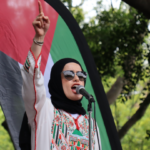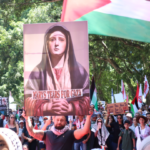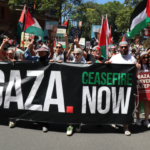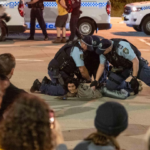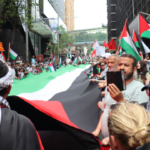Melbourne Antiwar Activists Disrupt to Heighten Genocide Awareness: An Eyewitness Account
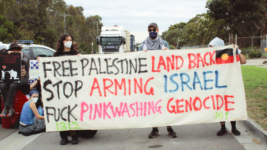
Antiwar activists descended upon Port Melbourne’s Lorimer Street and Todd Road at 6 am on 18 December, blocking six lanes of traffic leading to the premises belonging to the government-funded Defence Science Technology Group (DSTG) and multinational weapons manufacturer Leonardo.
Waving Palestinian flags and wearing keffiyehs, the joint Wage Peace and Block the Dock demonstration successfully stopped traffic entering the weapons facilities: a move that was clearly in opposition to their involvement in the Israeli state’s genocidal assault upon the Palestinians of Gaza.
The disruptive road action, which involved some activists locking on to a concrete barrel, saw traffic grind to a halt along the critical thoroughfare, as it achieved its aim in inconveniencing “business as usual”, which drew media attention and, in turn, that of the entire public.
Indeed, as a Nine News reporter chased one of eight activists taken into Victoria police custody, in an effort to ask whether the action “was the best way to get your message across”, the fact that this was being broadcast on prime-time news in full view of the nation made the query self-explanatory.
Facilitating mass death
Palestinian activist Shams Moussa explained that the Wage Peace-Block the Dock action targeted DSTG and Leonardo as “key players” in the local military-industrial complex. And he added that, as part of Defence, DSTG receives millions of dollars from government to develop weaponry.
“The Palestinian genocide begins in such laboratories,” the Block the Dock demonstrator added. “Our politicians share responsibility and, as a Nakba survivor’s child, I’m committed to stopping these activities by any means necessary.”
Wage Peace outlines that “Leonardo sells weapons direct to the Israeli military. “The most recent contract was for AW119Kx helicopters in 2022,” which were “purchased with $29 million in US government funding from their US operations”.
Zelda Grimshaw of Wage Peace outlined that the DSTG facility is where hundreds of engineers and scientists work to “make weapons more lethal and more profitable”. She added that Lockheed Martin, BAE Systems, Boeing, Raytheon and Thales all benefit from DSTG and are involved in Gaza.
Official narratives fall down
For its part, the Australian government has shown its unbridled support for the Israeli government in its onslaught on the Gaza Strip, having framed the assault on the 2.3 million Palestinians within the walled-in region as one of the most formidable militaries on the planet simply defending itself.
Australian Greens Senator David Shoebridge has confronted foreign minister Penny Wong as to why the DFAT website states that over the 5 years to 2022, Australia exported $13 million worth of arms and ammunition to Israel and yet, she claims no such exports have taken place for five years.
And despite the Greens justice spokesperson reasonably inquiring into this matter, the foreign minister, instead of answering, prefers to chastise her fellow senator as if he’s broken some unspoken rule of complicity.
Sydney Criminal Lawyers spoke to Block the Dock spokesperson Beth about the reaction to the recent Wage Peace blockade, the ongoing Indonesian occupation of West Papua and the fact that actions against the Gaza genocide are currently mobilising all week long.
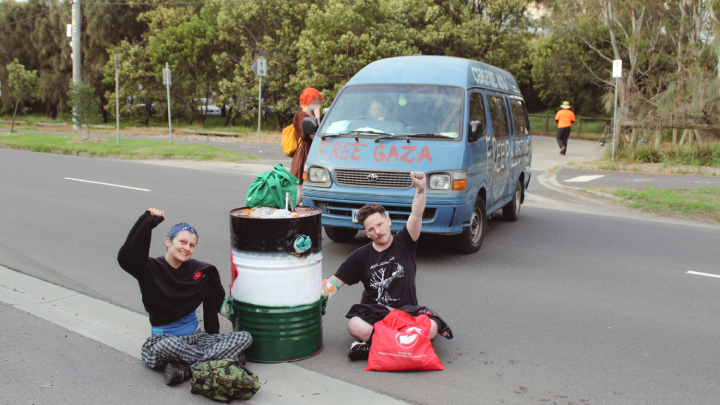
Wage Peace and Block the Dock blockaded the entrance to the Defence Science Technology Group (DSTG) and Leonardo weapons corporation in Port Melbourne on Monday 18 December. The action blocked six lanes and some demonstrators were arrested.
Beth, what sort of a commotion did you achieve on the day? And how was the police reaction?
On Monday 18 December, Wage Peace in collaboration with Block the Dock acted to block the roads to the Defence Science Technology Group (DSTG) and Leonardo, both weapons corporation facilities in Port Melbourne.
This demonstration intended to block the production and supply of Australian weapons to Israel, which contribute to the ongoing genocide in Gaza.
The decision to block six lanes of traffic was a strategic move to capture public attention, disrupt the usual flow of activities, convey the urgency of the message, and highlight the Australian government’s involvement in providing weapons to foreign countries.
The goal of the action is to put political pressure on the Australian government to no longer be complicit in war crimes.
The arrest of some demonstrators by the police underscores the tension and significance of the situation. It suggests that our peaceful protest, although disruptive, was impactful enough to prompt a response from law enforcement.
This attention from authorities could contribute to further discussions and awareness about the Australian role in the conflict and the ethical considerations surrounding weapons production and export.
Our demonstration successfully caused a disruption in traffic for six hours, drawing attention to the weapons manufacturing issue, and the police reaction, in the form of arrests, indicates the gravity of the situation and the need for public discourse on this matter.
This action was related to the genocidal policies of the Israeli government against the Palestinians and the Indonesian government against the West Papuans, as these weapons companies are complicit in these international crimes.
Can you elaborate on how DSTG and Leonardo contribute to these ongoing atrocities?
The Defence Science Technology Group and Leonardo weapons corporation are involved in the production and supply of military technology, including weapons, that may contribute to genocides worldwide.
The focus is on the Australian government’s complicity in international war crimes and genocidal policies implemented by the Israeli government against the Palestinians, and the Indonesian government against the West Papuans.
Israel’s ongoing genocide against Palestinian people sees DSTG and Leonardo involved via weapons manufacturing, which contributes to the supply of arms to Israel.
Israel has been accused of human rights violations and disproportionate use of force against Palestinians, with claims of genocidal policies particularly in Gaza.
On the situation in West Papua, Indonesia has faced accusations of human rights abuses, including violent suppression of separatist movements.
If DSTG and Leonardo provide military technology to Indonesia, they could be indirectly implicated in the conflict and human rights violations in West Papua.
While the direct involvement and complicity of these companies in specific international crimes would require detailed investigation, our action draws attention to the ethical considerations surrounding their operations, particularly in regions marked by conflict and allegations of human rights abuses.
The aim is to highlight the need for transparency and accountability in the arms industry to prevent potential complicity in such atrocities.
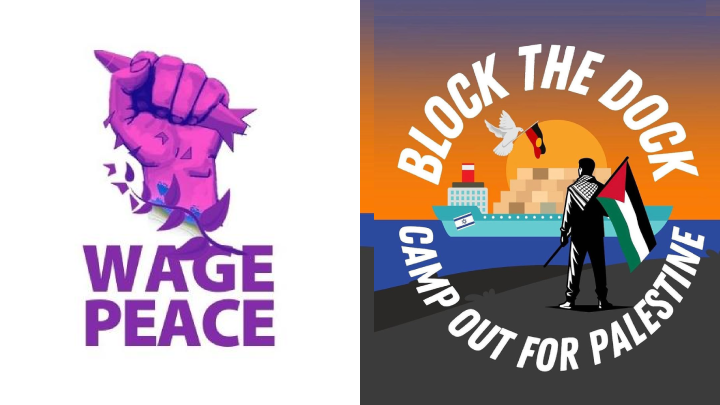
How does Wage Peace consider the form of the Australian government regarding the Gaza genocide and any impact its call for a ceasefire may have had upon this?
Wage Peace emphasises the importance of not just calling for a ceasefire but also actively working towards a just and lasting resolution to the conflict.
The organisation advocates for policies that promote accountability, human rights, and justice in the region, encouraging the Australian government to use its political influence to address the root causes of the Gaza genocide and uphold international law.
To be clear Australia did not call for a ceasefire.
The PMs of Australia, Canada and NZ released a joint statement which reads, “The recent pause in hostilities allowed for the release of more than 100 hostages and supported an increase in humanitarian access to affected civilians… we want to see this pause resumed and support urgent international efforts towards a ceasefire.”
This references a sustainable ceasefire but does not call for one. It says, if someone else asks for it, we will support them.
Also, the Australian government has long been charged with complicity when it comes to the occupation of West Papua on the part of Jakarta.
In your understanding, why is Canberra implicated in the atrocities taking place on the island of New Guinea?
Australia’s alleged complicity in the atrocities taking place in West Papua can be attributed to several factors:
The first are strategic interests. Australia has longstanding strategic interests in the Asia-Pacific region. Maintaining good relations with neighbouring countries, including Indonesia, is seen as crucial for regional stability and security.
This strategic calculus may lead the Australian government to avoid taking a strong stance on human rights abuses in West Papua.
Then there are economic interests. Indonesia is a significant trading partner for Australia, and economic considerations may influence Canberra’s approach to the situation in West Papua.
The Australian government may be hesitant to jeopardise economic ties by openly condemning Indonesian actions in the region.
There’s the historical and political context as well. Australia has historically been cautious in interfering in the internal affairs of its neighbours.
This approach, rooted in principles of noninterference and respect for sovereignty, can limit Australia’s willingness to address human rights violations in West Papua.
And refugee and asylum seeker considerations also influence this. Australia and Indonesia have cooperated on issues related to asylum seekers and refugees.
The Australian government may be reluctant to strain this cooperation by openly challenging Indonesia on matters such as the situation in West Papua.
Then there are the geostrategic considerations. West Papua is strategically located, and its resources are of geopolitical significance.
The Australian government may be mindful of regional power dynamics and geopolitical considerations in its response to the situation in West Papua.
While these factors may contribute to Australia’s perceived complicity, it’s important to note that official government positions and policies can evolve, and public pressure and advocacy can play a role in influencing government actions and responses.
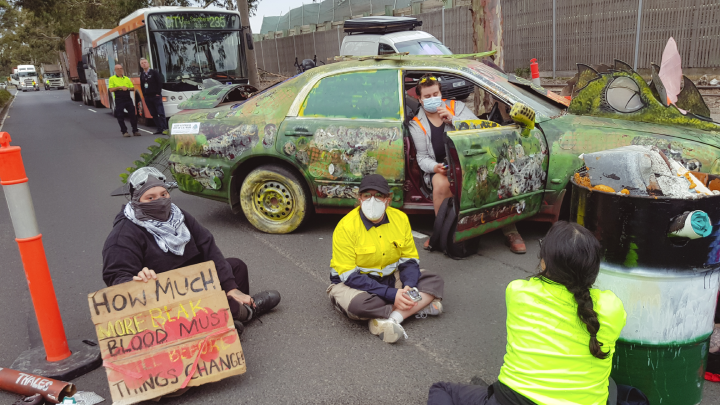
The Wage Peace-Block the Dock DSTG action made the nightly news. Often protesting weapons manufacturers and the war industry in general doesn’t garner a lot of attention.
Why do these sorts of protests tend to fly under the radar? And why’d the recent one make the news?
Protests against weapons manufacturers and the war industry can sometimes fly under the radar for various reasons:
These include the normalisation of the military-industrial complex. In some societies, the military-industrial complex is deeply ingrained and considered a normal part of the economy and national security.
Protests against it may not attract attention because of the perception that such industries are necessary for defence.
There’s also the limited coverage mainstream media provides, as it may have limited interest in covering protests targeting weapons manufacturers.
News outlets might prioritise other stories that they perceive as more sensational or relevant to a broader audience. The action on the 18th of December disrupted “business as usual”, which forced the mainstream media to pay attention.
Then there are the complexities of the issues as well, as the issues surrounding weapons manufacturing and the military-industrial complex can be complex and multifaceted.
Media outlets may find it challenging to condense and communicate these complexities in a way that engages the public.
We often see a lack of journalistic integrity in the coverage, minimising the message of the protestors and focusing on the traffic.
Further, protests often receive more attention when endorsed by celebrities or public figures. So, without high-profile endorsements, demonstrations against weapons manufacturers might not capture the media’s attention.
This often results in activists strategising ways to get their message across to the public more effectively.
Then there is the influence of the government and corporations. Media outlets may be influenced by the government or corporate interests, especially if they have strong ties to the military-industrial complex.
This can result in limited coverage or biased reporting. Often activists are misquoted or taken out of context by the media to invoke outrage from the public.
Mainstream media journalists have been intellectually dishonest in their coverage of protests and the ongoing genocide in Gaza.
As for the recent Wage Peace DSTG action making the news, several factors contributed to its coverage, with a key one being the disruption of traffic.
The blockading of six lanes of traffic is a significant disruption that captures media attention. Traffic disruptions tend to draw attention to the cause as they affect the public directly.
Then there’s the public interest factor relating to the issue of weapons manufacturing and its connection to international conflicts, particularly in Gaza, as this may resonate with the public.
Public interest and engagement can influence media coverage.
The protesters also had effective messaging and communication strategies making their cause more accessible and compelling to the media and the public.
The use of social media by activists is now amplifying the message and allowing it to reach a broader audience. And this protest gained traction on social media.
Then there was the current reference the protest had on the ongoing genocides and geopolitical tensions. So, protests related to weapons manufacturing seem more relevant, prompting increased media coverage.
Overall, a combination of factors, including the nature of the protest, effective communication, public interest and current events, can contribute to whether such demonstrations receive media attention.
And lastly, Beth, the Israeli-government perpetrated genocide in Gaza continues close to three months after it began. Over 20,000 Palestinians have now been killed.
Yet, despite a general effort on the part of the mainstream media to bury this reality, millions globally are taking to the streets, making clear that they don’t support the wholesale massacre of Palestinians, as well as revealing that the attempt to suppress this information isn’t working.
How do you consider these multiple war crimes, including those of genocide and apartheid, playing out 24/7 online are going to impact the future? Are these atrocities a turning point?
The widespread dissemination of information and the mobilisation of global communities through online platforms have significantly altered the dynamics of public awareness and activism.
The 24/7 online coverage of war crimes, including genocide and apartheid, in Gaza has allowed for real-time reporting and has provided a platform for individuals and communities to express their outrage, demand accountability and show solidarity with the affected populations.
There are a number of developments that may impact the future, including increasing global solidarity.
The online sharing of information enables people worldwide to connect and express solidarity with those affected by war crimes. This interconnectedness has the potential to foster a sense of global community and shared responsibility.
Greater accountability may be possible, as online documentation of war crimes can serve as crucial evidence for future investigations and accountability processes.
The widespread availability of information may contribute to holding perpetrators accountable for their actions. The nature of the way content is shared in real-time makes it more difficult for media outlets to control the narrative as in previous years.
Then there’s the widespread activism and advocacy, as online platforms empower individuals to engage in these pursuits.
The continuous coverage of atrocities may inspire sustained activism, prompting people to work towards policy changes and justice for the victims.
The global visibility of war crimes has further led to increased international pressure on governments and institutions to take decisive action. Online movements can influence public opinion, shaping diplomatic responses and policies.
And then there’s the greater awareness, as online coverage facilitates continuous understanding and education about the realities of conflict zones.
This sustained exposure may contribute to a more informed global citizenry, fostering a commitment to peace, justice and human rights.
While the impact of online activism is significant, its effectiveness depends on various factors, including the ability to translate awareness into concrete actions, engage with policymakers and navigate complex geopolitical dynamics.
The atrocities in Gaza may indeed serve as a turning point by stimulating a more connected and informed global community to actively address and prevent future human rights abuses.


